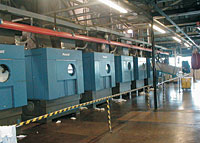
For years, Maple Springs depended on one, 150-horsepower firetube boiler to provide its steam. However, as the business expanded from an 8,000-square-foot building and increased its capacity to processing 100,000 pounds of laundry per shift, the cost of fuel to run the boiler was rapidly rising. Not only did they want to conserve energy, they wanted a boiler that was ecologically friendly.
Vice president and general manager Lee Bell said the company has been concerned about the environment throughout his 25-year tenure and earlier.

As a recent example, Maple Springs installed a new water filtration system that allows wastewater to be reused as initial flush water for soiled linens, greatly reducing its need for city water, explained Bell. Additionally, by preheating incoming city water with warm recycled wastewater, the business reduces fuel usage, and keeps its cost per pound competitive, said Bell.
TWO IS BETTER THAN ONE
In another development, the business installed two, 100-horsepower Miura low NOx boilers. These two compact units coordinate with each other in response to changing steam demand. As Bell noted, "When demand slacks off, one of the boilers will automatically go into a low-fire mode, while the other modulates down."Since the installation several years ago, Maple Springs Laundry has seen its gas bills drop by 19 percent, while the price of natural gas has been soaring.
"We paid $5.70 a decatherm in 2004," said Bell. "We paid $16.47 a decatherm in 2005. For October 2004, our gas bill was $25,858. Our gas bill for October 2005, was $57,882."
Had they still depended on the firetube boiler to provide their 70 hours of steam per week, their bill would have been $10,997 more, he explained.
With a decatherm costing $5.70 when they bought the Miuras, Maple Springs calculated it would take a bit over three years for the gas savings to pay for the new units. Now, with a decatherm costing more and more, it takes only a little over a year for the energy savings to pay for the units.

LESS WATER
Bell said Maple Springs' boiler inspector had some concerns."Our boiler water treatment expert and the inspector had some ‘ifs and ands,' but, now, both of them are saying you did the right thing," said Bell.
In regard to water treatment, the expert was worried about the boiler's blowdown. The units only have 29 gallons of water in them, whereas the firetube has around 1,000 gallons of water, explained Bell.
"You can blow all the water out of the Miura, while it is hot, and then put it right back on-line. Of course, you wouldn't want to blow a thousand gallons of water out of the firetube, anyway. You blow down the firetube to 70 pounds of steam and then you have to build it back up again," said Bell. "We always had to do this after the plant was shut down. I can blow down the Miura whenever it is necessary and the plant operations won't be affected."

Now, Maple Springs Laundry services 28 hospitals at its 45,000-square-foot processing facility. The business currently services a delivery radius of 110 miles from Hickory, which covers parts of South Carolina. It is proud of its 24-hour turnaround on linens, six days per week (with the exception of Christmas holidays).
Maple Springs has decided to add another 24,000 square feet of space to the plant, in part thanks to the increased capacity and savings offered by its energy-efficient boilers.
Publication date: 05/15/2006

Report Abusive Comment